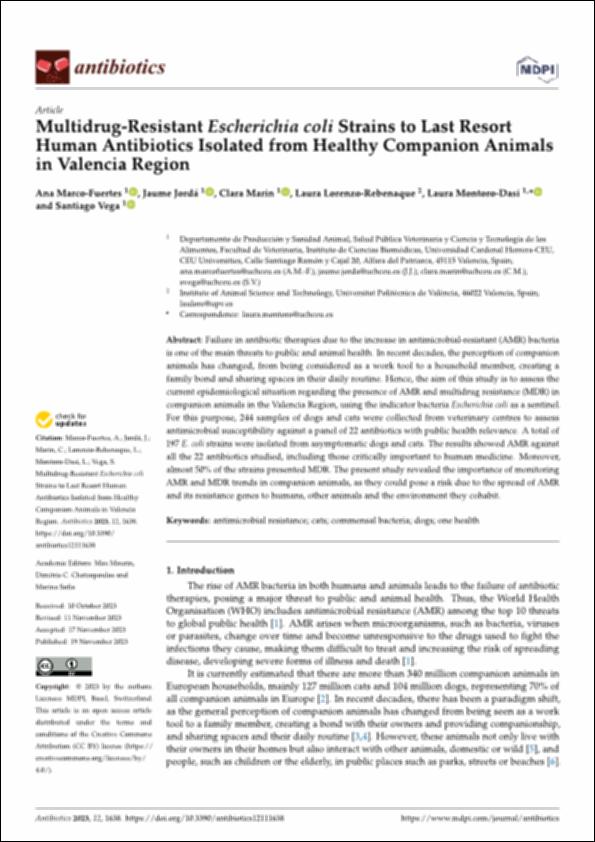Please use this identifier to cite or link to this item:
http://hdl.handle.net/10637/15311Multidrug-resistant "Escherichia coli" strains to last resort human antibiotics isolated from healthy companion animals in Valencia region
| Title: | Multidrug-resistant "Escherichia coli" strains to last resort human antibiotics isolated from healthy companion animals in Valencia region |
| Authors : | Marco Fuertes, Ana Jordá Moret, Jaume Vicent Marín Orenga, Clara Lorenzo Rebenaque, Laura Montoro Dasí, Laura Vega García, Santiago |
| Keywords: | Resistencia a los medicamentos; Drug resistance in microorganisms; Bacterias; Bacteria; Gatos; Cats; Perros; Dogs; Escherichia Coli |
| Publisher: | MDPI |
| Citation: | Marco-Fuertes, A., Jordá, J., Marin, C., Lorenzo-Rebenaque, L., Montoro-Dasi, L. & Vega, S. (2023). Multidrug-resistant "Escherichia coli" strains to last resort human antibiotics isolated from healthy companion animals in Valencia region. Antibiotics, vol. 12, i. 11 (nov.), art. 1638. DOI: https://doi.org/10.3390/antibiotics12111638 |
| Abstract: | Failure in antibiotic therapies due to the increase in antimicrobial-resistant (AMR) bacteria is one of the main threats to public and animal health. In recent decades, the perception of companion animals has changed, from being considered as a work tool to a household member, creating a family bond and sharing spaces in their daily routine. Hence, the aim of this study is to assess the current epidemiological situation regarding the presence of AMR and multidrug resistance (MDR) in companion animals in the Valencia Region, using the indicator bacteria Escherichia coli as a sentinel. For this purpose, 244 samples of dogs and cats were collected from veterinary centres to assess antimicrobial susceptibility against a panel of 22 antibiotics with public health relevance. A total of 197 E. coli strains were isolated from asymptomatic dogs and cats. The results showed AMR against all the 22 antibiotics studied, including those critically important to human medicine. Moreover, almost 50% of the strains presented MDR. The present study revealed the importance of monitoring AMR and MDR trends in companion animals, as they could pose a risk due to the spread of AMR and its resistance genes to humans, other animals and the environment they cohabit. |
| URI: | http://hdl.handle.net/10637/15311 |
| Rights : | Open Access http://creativecommons.org/licenses/by/4.0/deed.es |
| ISSN: | 2079-6382 (Electrónico) |
| Issue Date: | 19-Nov-2023 |
| Center : | Universidad Cardenal Herrera-CEU |
| Appears in Collections: | Dpto. Producción y Sanidad Animal, Salud Pública Veterinaria y Ciencia y Tecnología de los Alimentos |
Items in DSpace are protected by copyright, with all rights reserved, unless otherwise indicated.


